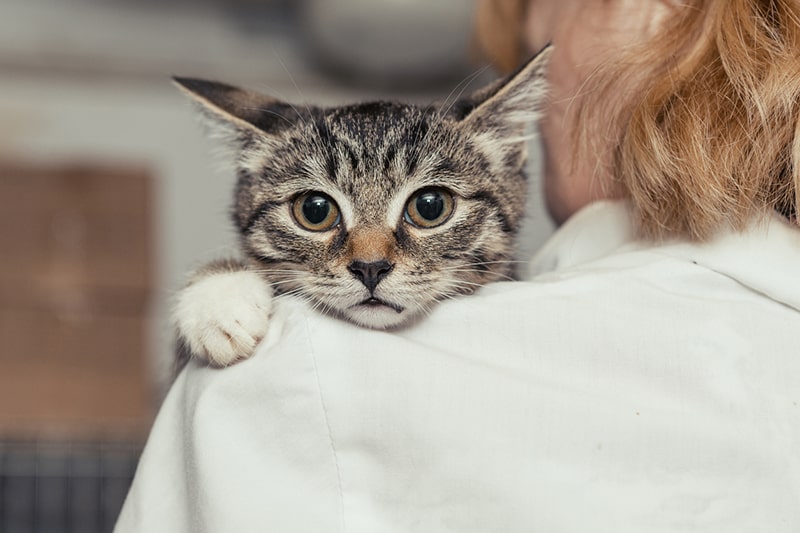What To Do When a Stray Cat Adopts You
Taking in a stray cat is incredibly rewarding, but there are a few things to be aware of before welcoming a new cat into your home.
Can cats get pneumonia? Yes, our feline friends can get sick with pneumonia, and it can be life-threatening if it's not properly treated.
Pneumonia is an inflammation in the lungs, which causes difficulty breathing and a decreased level of oxygen in the blood. Cat pneumonia symptoms include:
You may also observe behavioral changes, such as severe tiredness, resistance to exercise or play as normal, or hiding more often than usual. If you notice these signs, you should take your cat to the veterinarian to get checked out as soon as possible.
All cats are at risk for pneumonia, but it tends to be more common in very young kittens, senior cats, or cats with health conditions, since they may have a weakened immune system. Cats can contract pneumonia in a few different ways:

If you think your cat may have pneumonia, you should take them to the veterinarian as soon as possible. Your veterinarian will review your cat's medical history and conduct an exam that will include listening to the heart and lungs with a stethoscope to detect any cardiac or breathing abnormalities.
In addition, your veterinarian may perform diagnostic tests, such as blood work, chest X-rays, and a tracheal wash. During a tracheal wash, which is done under anesthesia, your veterinarian will use fluid to collect bacteria from the trachea for testing and identification. This allows them to prescribe the best antibiotic to clear the infection.
The first stage of treatment for pneumonia is to stabilize the cat. This can include oxygen therapy or a nebulizer treatment to help ease breathing as well as intravenous (IV) fluid therapy for dehydration. Depending on the severity of the pneumonia, your cat may need to be hospitalized for close monitoring.
Infectious pneumonia will initially be treated with a broad-spectrum antibiotic. If your veterinarian performs a tracheal wash, they may switch the antibiotic based on the test results. In the case of fungal pneumonia, an anti-fungal medication will be needed to clear the infection.
While there are some feline zoonotic diseases (e.g., toxoplasmosis and cat scratch fever), pneumonia is not one of them. “Cat flu” is also not contagious, with the rare exception of avian or bird flu (H7N2). However, cats can pass viral or bacterial pneumonia to other cats, dogs, and small animals in the house.
To prevent the spread of the disease, separate your sick cat from other pets in the house. You can put them in a warm room with a bowl of food and water. Be sure to check on them regularly. If you have multiple cats, you should place a towel or blanket at the bottom of the door to prevent cats from sniffing each other or touching paws under the door.
You should also clean anything they may have contaminated. For instance, wash their food and water bowls, clean their litterbox, and wipe down their toys. In addition, be careful to wash your hands after handling your patient to avoid transferring germs that way.

Your cat will need plenty of rest as they recover from pneumonia at home. Set up a cozy place for them to relax away from other pets in the home. You'll need to restrict their activity, although your veterinarian may recommend short bouts of exercise to help loosen mucus and clear the lungs.
Be sure your cat has plenty of fresh water available to help avoid dehydration. If your cat is not drinking from their water bowl as much as usual, you can try adding a little tuna water to make it more tempting. You can also offer them wet food to help increase their water intake since it has a high moisture content. Wet food may also stimulate your cat's appetite and encourage them to eat more.
If your cat is on any medications, please follow the dosage instructions carefully to ensure that they are getting a safe and effective amount of the drug. Cats can be very sensitive, and you should never give them any medication without consulting with your veterinarian.
Cats are susceptible to upper respiratory infections (URIs), which are sometimes mislabeled as “cat flu.” This is a misnomer since it is typically not caused by an influenza virus. However, the symptoms of a URI are similar to the flu in humans. They can include runny nose, sneezing, watery eyes, fever, and trouble breathing.
They are also similar to the symptoms of cat pneumonia, which is why it's important to take your cat to the veterinarian for an accurate diagnosis. This will help ensure your cat gets the right kind of treatment for their specific health condition and can start feeling better soon.
The best way to help prevent pneumonia is to do what you can to maintain your cat's overall health. This includes offering them a nutritious diet along with plenty of physical and mental stimulation. You should also take them to the veterinarian on a regular basis. Routine wellness exams can help your veterinarian track your cat's weight and keep an eye on their health in general. They also allow them to detect illnesses in the early stages when they can be easier to treat, and the outcome can be better for your cat.
If your cat does get pneumonia, pet insurance can help you manage the costs of care from initial diagnosis all the way through to any needed follow-up visits. Get a free quote for your cat now.
The information presented in this article is for educational and informational purposes only and does not constitute or substitute for the advice of your veterinarian.